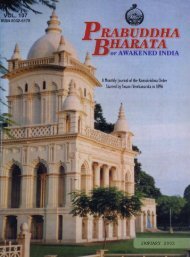October 2011 - Advaita Ashrama
October 2011 - Advaita Ashrama
October 2011 - Advaita Ashrama
Create successful ePaper yourself
Turn your PDF publications into a flip-book with our unique Google optimized e-Paper software.
40<br />
humans would need to be revised. Often social<br />
scientists question this, since they believe their<br />
study is only of manifested behaviour. But as has<br />
been stated in many ancient texts, consciousness<br />
is both internal and external, transcendent<br />
and immanent. Has it ever been considered<br />
by science that consciousness can be an energy<br />
that manifests as form, which includes words,<br />
thoughts, and other conceptual and symbolic<br />
ways? Consciousness is not a thing, so how can<br />
anyone possibly examine it with the tools of empirical<br />
science? It should require another methodology.<br />
The mind has the capacity to examine<br />
itself by looking at its creations as reflections of<br />
consciousness. It is like studying subatomic energy,<br />
which is examined only by the way it manifests<br />
and not in a particular context at all times.<br />
We also need to consider that as consciousness<br />
is primordial, it has always existed—there is no<br />
primitive or advanced consciousness. Within this<br />
framework all beings are equal, though apparently<br />
different. It is this view alone that may transform<br />
the way we see the world around us. This clearing<br />
up of all false identifications, of the illusion of<br />
narrow visions, takes place effortlessly, on being<br />
awake. But who is awake? We are told that it is<br />
that personal-impersonal Being, infinite, eternal,<br />
to whom no thought or word can describe.<br />
Therefore, consciousness cannot be grasped<br />
intellectually, although as manifested form it<br />
identifies and locates itself within the biosocial<br />
memory patterns symbolically encoded. While<br />
it is beyond words, sometimes it is intimately<br />
expressed in poetry, music, and other aesthetic<br />
creations, in some works of science, and of<br />
course in authentic mystic experiences. These<br />
moments of communion with that Being occur<br />
when the limited ego disappears and they bring<br />
about immense peace and tranquillity, that ineffable<br />
experience in which there is neither the<br />
ex periencer nor the experienced, because both<br />
644<br />
Prabuddha Bharata<br />
are one. This happens when there is stillness of<br />
the mind. Such impersonal revelations of consciousness<br />
are truly objective, speaking in academic<br />
terms, while the objectivity, in normal<br />
scientific discourse, is relative. The moments in<br />
which the individual perceives consciousness are<br />
authentic moments, while the pseudo-scientific<br />
ones are not. The former are not quantifiable,<br />
yet available at any time. Thus, authentic communication<br />
at this level of awareness, which is<br />
impersonal, allows for true understanding with<br />
regard to situations, events, and persons.<br />
A Play of Consciousness<br />
Most explanations of the external world are mechanistic<br />
interpretations of the processes of life.<br />
Exam ining the mind in this manner is like looking<br />
for an operator in a television set or in the<br />
integrated circuits of a computer. But the mind<br />
does not exist apart from consciousness. Those<br />
who try to prove that the mind begins and ends<br />
in the brain can prove it only in an intellectual<br />
way; that is, through their minds. Is this ‘knowing’<br />
to be located in the individual’s brain or in the<br />
mind? Is the knower a by-product of biochemical<br />
workings? Surely the knower cannot be a transient<br />
derivative arising out of atoms and molecules<br />
of lesser known matter, because if it were so we<br />
would not be able to enquire about creation or existence,<br />
about what is real and what unreal. Could<br />
it not be then that matter is nothing but the universal<br />
mind, a manifestation of consciousness? It<br />
is itself the known, the knower, and the knowing.<br />
Thus, understanding consciousness is crucial in<br />
all aspects of life. This has been expressed in many<br />
lives down the ages and it is the grand expression<br />
of all civilizations. Once again, consciousness cannot<br />
be accessed by a limited rational-empirical,<br />
positivistic, and reductionist philosophy, and<br />
much less by gross tools of measurement.<br />
(Continued on page 646)<br />
PB <strong>October</strong> <strong>2011</strong>

















